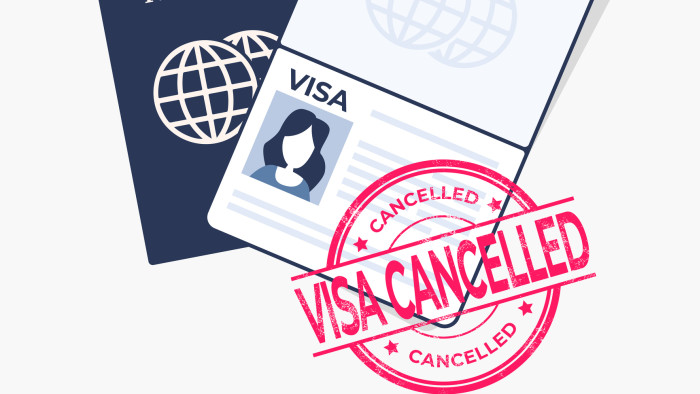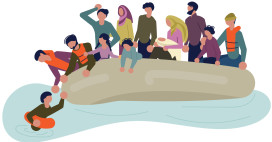
Arrested as a Perpetrator, Sentenced as a Victim: A Fight Against Injustice
The European Impacted Persons Advisory Council (EIPAC) is an advisory committee composed of people with lived experience in various aspects of the criminal legal system who are committed to supporting the reform of the system. Formed in 2024 as an advisory body to Fair Trials Europe, EIPAC ensures that the voices of impacted persons shape policies, campaigns, and the Fair Trials advocacy efforts. This is “EIPAC Voices: Stories of Lived Experience in Justice Reform” a monthly blog series, introducing EIPAC members and their personal experiences.
“Why did you change the date on your visa?” the Immigration Officer snapped at my partner over the counter at the Thai-Cambodia border.
“What?” she responded, confused.
The Officer shoved the passport toward her, revealing a red pen mark altering the number ‘5’ to ‘6’ August 2019.
“Why did you write over the visa stamp?” he repeated.
My partner was stunned, denying the accusation.
Being next in the queue, I flipped open my passport. My stomach dropped. The same red pen mark. I could not think of an explanation. In any case, it was too late.
We were taken into an interrogation room, still completely unaware that we were under arrest. Our agent, who had handled all our paperwork and was assisting with the border crossing that day, seemed locked in an argument with the officials. They spoke in Thai. The only explanation I could think of was that the Immigration Officer at the Laos border, issuing the original visa, must have stamped the wrong date and tried to correct it himself.
Our agent came over to explain that she was in possession of photocopies of the passports the day after crossing the Laos border, there was no evidence of a red pen mark. It must have happened afterwards.
“Did you give your passport to anyone else since then?” she asked.
“Yes” we answered. “To ‘your’ staff member who works at our school.”
We were escorted in a police vehicle to the nearest police station. Our agent looked nervous. She said we’d need to stay the night while she and the police ‘cleared something up.’
We offered to stay in a nearby hotel.
Her face changed. She explained that we would need to stay in the police station.
“Here, on this bench?” I asked.
Before she could answer, a police officer approached with a heavy bundle of keys. He smirked and gestured toward the back.
Moments later, we were behind bars. I had never imagined myself behind bars at the age of 23. That’s where we remained, watching the long weekend crawl past in confusion and terror. We couldn’t eat. We couldn’t sleep. Fear gnawed at us. Each hour dragged as we sat on the cold floor with nowhere to go.
Our minds looped with the same question: How did we end up here?
We were ushered out of the cell one morning and taken upstairs to face the investigating officer who would soon become our greatest adversary. He placed a document in front of us to sign. We refused to sign until we understood its contents. Our agent tried to translate, nervously and unclearly. Through the blur, one line stood out: ‘the accused admitted to altering the visa.’
“Stop!” my partner shouted. “Change that immediately!”
Sheepishly, the officer altered the wording, caught in his tactics.
Without further delay, we were placed in a police vehicle with other detainees and driven to the provincial court, unaware that we would already face a judge.
We stood before a camera. The judge appearing as a tiny image on the screen above us. With no legal representation and no offer of one, we simply stood there, unable to speak for ourselves as the proceedings continued in Thai.
Bail was set at an unfathomable amount. We were sent to a bigger holding cell packed with noise and chaos.
“By when do we need the money?” I asked my agent, hopeful.
“You have an hour,” she said.
I slumped to the ground. As a student teacher earning the bare minimum, I had no idea how to raise such a large sum of money in only an hour. Luckily, we had our cell phones. We contacted colleagues, begging for help. We watched in anticipation as our bank balance slowly rose. Miraculously, we raised enough to release one of us. The one released would withdraw from our international cards and bail out the other.
Someone called my name. I looked at my partner.
“I will be back soon, I promise.”
Her fearful eyes are burned into my memory.
“Please hurry,” she pleaded.
I ran to the ATM, withdrawing from every card we had. With the total amount in hand, I rushed back to the cash counter.
“I’m here to bail out my colleague. Here is the total in cash,” I said.
The clerk didn’t look up.
“You’re too late. Court is closed,” he said dismissively.
It was 13:05 (no one told me the court would close at 13:00).
I begged and pleaded for the clerk to accept the money. Instead, he explained abruptly that for her release, the bail amount would be doubled. A stabbing pain shot right through my heart as I fell to my knees in disbelief.
Meanwhile, my phone buzzed. A message from my partner.
“I’m in a police van with male prisoners. They’re all tied together. What’s going on?”
My hands trembled.
“We were too late. The court closed.”
“No, please, no. Don’t let them take me away.”
I followed the vehicle, trying desperately to trade places with her. In her final message to me, she told me that she had arrived at the provincial prison and was in line to be strip-searched.
I had never imagined myself behind bars at the age of 23. We couldn’t eat. We couldn’t sleep. Fear gnawed at us. Each hour dragged as we sat on the cold floor with nowhere to go. Our minds looped with the same question: How did we end up here?
I spent the rest of the week in Bangkok, trying to come up with the money. Every minute I took, each small delay meant another day in prison for her. I visited banks, embassies, called everyone I knew. I already knew that every hour in that place feels like a lifetime. I understood her suffering.
I remember clearly the day she was released. The large prison gates slowly opened, she walked out and we all embraced. For that moment, nothing else mattered. She was finally safe.
But this wasn’t the end. This was only the beginning. Three months of investigation began. Considering that our passports had already been confiscated on arrest and we were not at flight risk, it seemed excessive that we also had to sign into court every 12 days, 14 hours away from where we lived. These conditions were over and above the cash bail sum already securing our cooperation. In addition, we were told we were officially overstaying our visas and that the Immigration Police could arrest us at anytime. We were trapped. We couldn’t work legally, rent property, or roam around freely. I felt like a fugitive. I felt like I was already being treated as guilty before my innocence was even considered.
One day our agent called. She had something to tell us and insisted on taking us to lunch. We sat in front of our large bowls of ramen, unsure whether her words would steal our appetite or bring it back.
She explained to us, with a beaming smile, that her staff member confessed. “He changed the dates because he was running late with your paperwork.” She told us that he was on his way to the investigating officer to make a full statement.
“Soon, this will all be over” she said with confidence.
We cheered out in complete relief, happiness and joy!
“Soon, this will all be over” I repeated in my head.
We always wondered why our investigating officer delayed until the very last day of the investigation period to conclude his findings, despite having the confession for over two months. Nevertheless, we had faith in the process and were ready for our final court check-in.
When we arrived at court that day, we were given the usual tiny paper to sign and an additional stack of documents, all in Thai. Our agent looked confused.
“Is something wrong?” I asked impatiently.
With hesitation she replied: “The prosecutors have decided to prosecute your case, no longer for visa forgery, but for the use of a forged document.”
That very same stabbing feeling I felt in my chest on that first day in court returned to me, except this time I also felt it pierce right through my lungs.
That night, I cried from the pit of my soul. I knew what this meant. We would be stuck in Thailand for at least two more years, a prison sentence looming over us. No matter the evidence, they wanted us to pay. Fairness no longer existed, it all started to feel like a game of strategy.
“You either play to their rules or lose the game,” I thought to myself, and now we had no choice but to enter the game.
We were told we were officially overstaying our visas and that the Immigration Police could arrest us at anytime. We were trapped. We couldn’t work legally, rent property, or roam around freely. I felt like a fugitive. I felt like I was already being treated as guilty before my innocence was even considered.
Finally, we hired lawyers and started to prepare our pleas of non-guilt. After numerous consultations and court submissions, we were ready for our day of pleading. This time, we knew what to expect; we would meet our prosecutors who would state the charges against us. The judge, in turn, would ask us what we plead, to which we would respond “Not guilty.” We were well prepared, this time, no surprises.
Yet, to our surprise, we found ourselves exiting the courtroom, joined by our lawyers and the prosecutors. We were informed that the judge had asked us to step outside and ‘come to an agreement.’ Our lawyer told us that the prosecutors had an offer: plead guilty in exchange for the judge to lift our immigration ban, allowing us to leave the country.
I was horrified. To confess to a crime I didn’t commit was unthinkable. “It must be a trap,” I thought.
But the words of the lesson I had previously learned swirled in my head: “You either play to their rules or lose the game.”
With shame and disgrace, we returned to court, stood before the judge and muttered the words: “Guilty.”
After minutes that felt like hours, the judge read the sentence: “Two years imprisonment, one year suspended.”
“What does it mean?” I asked our lawyers.
“It means you do not serve time. You can go home.”
My partner and I embraced, tears streaming down our faces.
I was horrified. To confess to a crime I didn’t commit was unthinkable. “It must be a trap,” I thought. But the words of the lesson I had previously learned swirled in my head: “You either play to their rules or lose the game.”
From the very beginning, we were at a disadvantage. We could not exercise our right to translation nor benefit from a state-appointed lawyer. We bore the pitfalls of the cash bail system and suffered through the overuse and disproportionate use of bail conditions. We felt the burden and stigma of being illegal immigrants. We endured police, prosecutorial and judicial tactics and eventually succumbed to the evils of plea-bargaining. Nevertheless, and despite it all, I am blessed to say that the story ended well. The judge fulfilled her end of the bargain by lifting our ban and we were free to return home.
These events changed my life. I now wake up every day with purpose: to fight against systematic injustices. After these events took place, I went to tell my story in court when I had to petition for myself to become admitted as a lawyer despite my ‘criminal record’. Today, I am a qualified attorney and I will use not only my legal training but also my lived experience to reform the ‘rules of the game’ because the criminal process is not just ‘a game’, it’s people’s lives.
Author: Angelica Vieira, lawyer and EIPAC member.
Article edited by: Ángela Rodríguez, Fair Trials’ Communications Officer.
As part of our commitment to centering impacted voices, Fair Trials will feature a monthly blog series, “EIPAC Voices: Stories of Lived Experience in Justice Reform,” introducing EIPAC members and their personal experiences. These stories highlight the human cost of justice system failures while reinforcing the need for fairer, more rights-based approaches to justice.


